Gold for safe passage: How a family of 12 escaped from Sudan
Egypt seemed so close – but Raga Makawi and her relatives were stranded at the border for days after fleeing Khartoum.
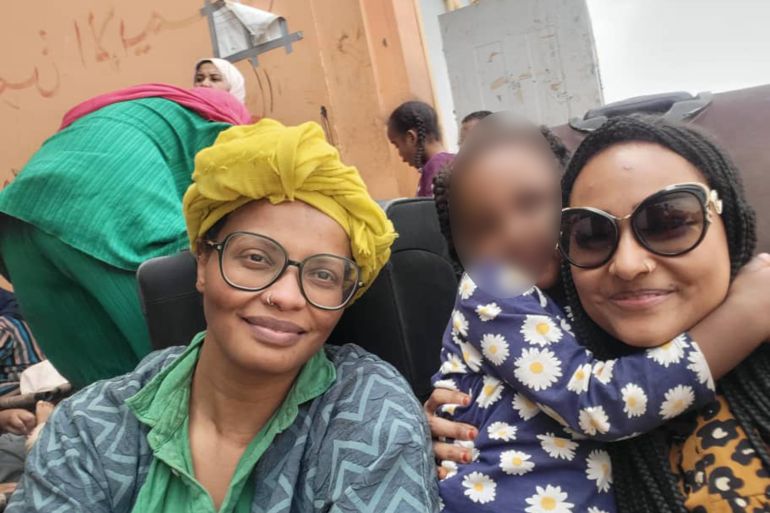
I scrambled up the stairs for the 12th time that day. Since the outbreak of violence in Khartoum on April 15, I had been advocating for our departure to no avail. My parents, elderly and set in their ways, had pledged to die where they stood before being subjected to the adversity of displacement.
It was April 22, day eight of the fighting and already getting too late to leave.
Keep reading
list of 4 itemsFleeing Sudan: ‘I had to do it for my daughter’
The Sudan crisis: A power struggle by design
Is Sudan’s conflict beyond control?
We were a big family of 12. The youngest, my nephew Yassin, was not even two. Throughout all the intense meditation, matched by the outside sounds of fighting, my sister-in-law Tibyan, who lived in the same compound above my parents, was my biggest ally. We lobbied arduously, never shying from weaponising sensationalist war rhetoric to get the job done.
Having previously worked in post-war Darfur for the United Nations between 2006 and 2012, I knew what came after the hostilities. I told stories of rape and starvation and Tibyan, a mother of five, was more receptive to them than the others.
I had gone to Khartoum on a short work visit a week before and witnessed the war break out. I made the arduous trip to Egypt by road together with thousands of other Sudanese. The journey from Khartoum to Aswan, Egypt, usually takes a day at most – it’s about 15 hours by road to Argeen, one of two main crossings along the Egypt-Sudan border, and another five or seven hours to Aswan.
My family and I found ourselves displaced overnight and were stranded at Argeen for five days because it was closed.
Despite the horrors of conflict and the failure and absence of the state, a moral economy emerged through which people sought to support each other and resolve bureaucratic hurdles.
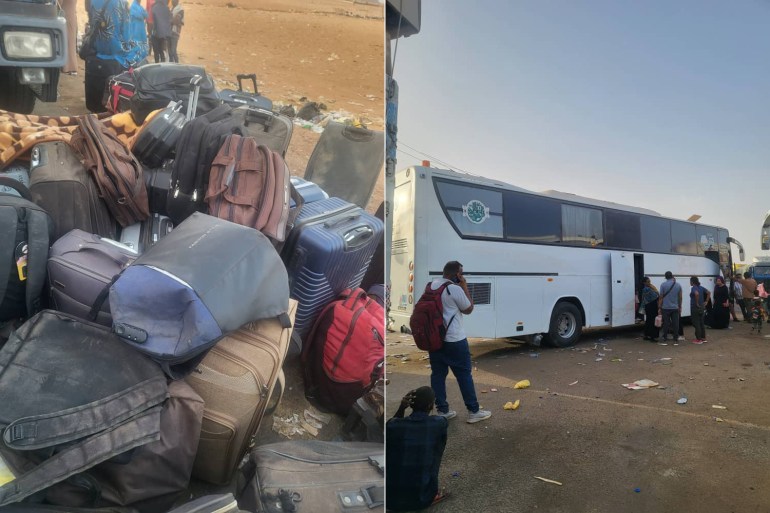
Dollars as exit tickets
In my hand, I held closely and with care, our exit ticket. Tibyan and I counted the dollars carefully over and over while calculating the cost of traveller per seat. The plan was to take the northern route through Nubia to Argeen in about 15 hours.
Driving our own cars would have been the easier, cost-effective option, but news of highway robberies, particularly the looting of cars, personal belongings and possibly death, was rife. Instead, a family bus would provide protection from armed groups and thieves, both probably one and the same.
I had exhausted the avenue of airlifting my parents out of Khartoum. My evacuation privileges as a British citizen did not extend to them.
We counted $7,000, between the money I brought over from the UK for my work trip and the stowed away cash for hardship my mother had, which I forcefully confiscated.
I had to begrudgingly ask back the financial gifts I’d given to family members. With the banking system down, people held on dearly to whatever little cash they had, suspending in the process the communal support network the public usually relied on in the difficult circumstances that had come to define Sudan’s pre- and post-war transition.
The cost of a bus to Aswan, in southern Egypt, was $13,000 – an exorbitant amount that was increasing by the hour, possibly tied to the volatile prices of fuel on the black market.
Several phone calls later, we had found willing travellers to take over the empty seats, completing the missing budget.
We set off the next day, April 23, with the elderly, children and the few female adults spearheading the relocation. We were 12 in total, five adults and seven children. We only took some clothing, non-perishable food and our most precious valuables and documents.
The men had opted to stay behind. With no visas, they needed to find alternative ways to leave the country. My brother who was the last to leave, stranded in Khartoum for almost a month, has since managed to leave the country for Dubai, through Port Sudan.
Perilous journey to safety
We drove slowly in a convoy of cars to the bus stop, a short but dangerous first leg of the trip, and made it without complications.
We scrambled on top of each other and settled in, bags stowed below and some food and water in hand. The journey was long but not gruelling. More than a dozen hours later, at approximately 1am on April 24, we arrived at the Argeen crossing. I looked on in hope as Egypt was a mere 10km (6.2 miles) away.
A long line of buses ahead of us signalled a crisis, one whose magnitude I did not foresee. The bus driver disembarked, summoning four of us women. He callously explained that, despite his earlier agreement, he could not ferry us to Aswan and that we would have to make our own arrangements. No amount of pleading worked to convince him otherwise.
We would have to find a new driver and vehicle to get to Egypt.
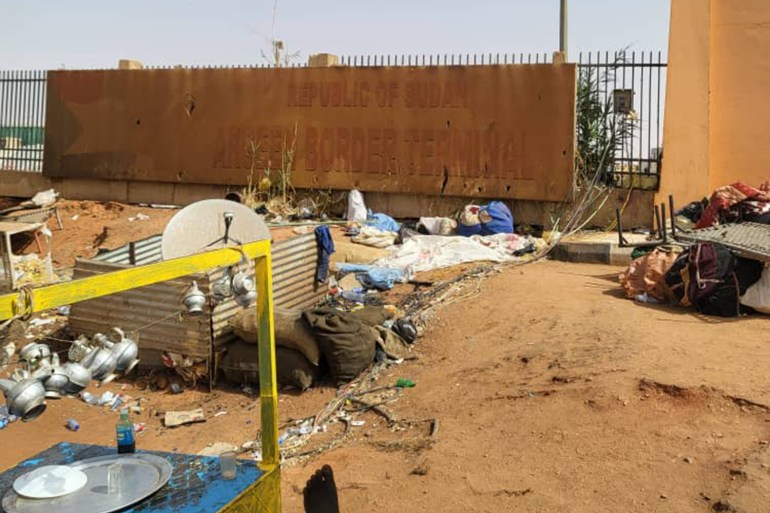
In hindsight, I believe he made millions running the same route, cheating many other women like us desperate to leave out of precious time and money. My anger built up as I realised that we were victims not just of a war economy that followed us to the border, but of traders during a crisis who exploited women’s unassuming tools in navigating a toxic male-dominated public space.
Women — marginalised, but taking control
Sudan’s revolution had brought about a change in social relations afterwards, albeit with limited empowerment opportunities for women. Women – who had spearheaded the revolution and paid its highest price – continued, during the transition, to suffer from the political marginalisation and lack of visibility that featured in previous regimes.
The centring of the political process around the will of armed actors reproduced the same problematic policies while paying lip service to social transformation. As a result, the worsening economic conditions and rampant insecurity were borne by its female population, now subjected to the hardships of having to fend for themselves. The cracks in an otherwise ultra-conservative social order where women occupied the private realms of the household featured strongly in the aftermath.
During my five days at Argeen, I met many women, single and married, who were leading the relocation of their entire families with very little means. I noted with despair the disrespect and disregard they encountered from their male fellow travellers, the authorities at the port and most of all, service providers – who, despite being paid by these women, felt they could with impunity lie, raise prices and renege on their agreements, as had been our case.
In the absence of men, women were left to negotiate passage and means of survival, from bus drivers to state officials to food and fuel traders.
Sudan’s post-war order is as its predecessor: misogynistic.
Together with a few of the women on our bus, we pushed forward past the long line of buses looking for a new driver to commission from Argeen to Aswan. We had no money to bargain, but decided to cross that bridge in time.
My sister-in-law had broken her gold into pieces to sell and hid it throughout the journey in her two-year-old’s nappy, a safeguard should we be stopped by the paramilitary Rapid Support Forces (RSF). We planned on trading gold for safe passage.
Eventually, we found a driver willing to take us the remaining 170km (105 miles) to Aswan. His asking price was $8,000, despite the dire condition of his vehicle. Windows shut fast, and no air conditioning, we agreed begrudgingly, lest this opportunity pass and we fail to find another. The children would have to endure.
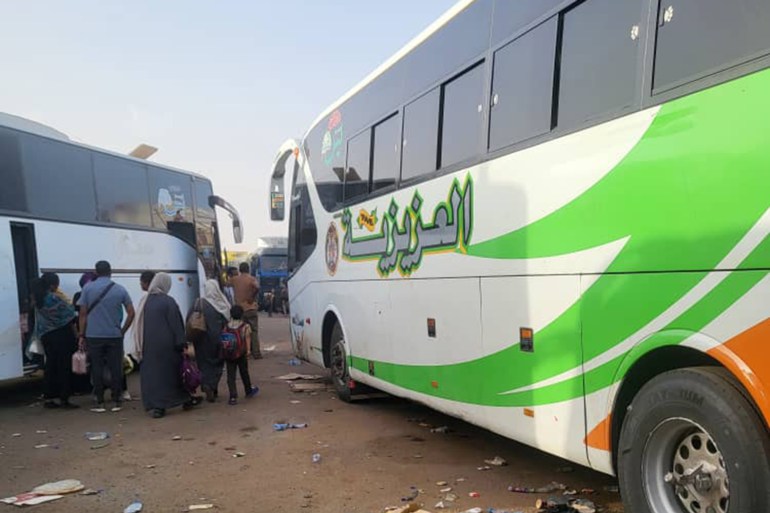
Waiting game
In the early morning hours of April 24, our first day at Argeen port, we settled somewhere on the ground in close proximity to the newly commissioned bus. We laid out a huge bed sheet on the sidewalk, my parents lay down, the children next to them. We sat nearby chatting about our plans. Approximately seven hours later, the passport office on the Sudan side commenced its document processing at around noon.
The situation was chaotic, thousands of people queued at poorly equipped government offices. Misinformation and lack of clarity meant that we, as well as others, wasted long hours at the wrong windows. As a course correction, the authorities eventually moved to create a separate service outlet for women.
As we crammed in at the small window, I could hear the agonised screams – a stampede pushing from behind was crushing women at the front. Fights broke out and shortly thereafter, fists replaced words. One woman, passports in hand, grabbed my fingers twisting them. I cried out before berating her. I then turned my face, and looking ahead, I tried to tune out the brawling voices.
Several hours later, passports stamped, and egos bruised, I sat at a distance from my family, holding back tears. I was contemplating what would become of us: How much will it cost and how long will it be before we reach Cairo? Where would my parents stay and for how long? How can I make sure they are provided for and safe? Is a safe return to Sudan an option in the short term? The guilt of leaving my aunt and her children behind without any financial aid lingered in the background.
My stream of thoughts was interrupted by a gentle tap on my shoulder. It was the middle-aged woman with whom I had entered into an altercation in the passport queue. She gently apologised, I reciprocated, and we chatted briefly about the plight we found ourselves in overnight.
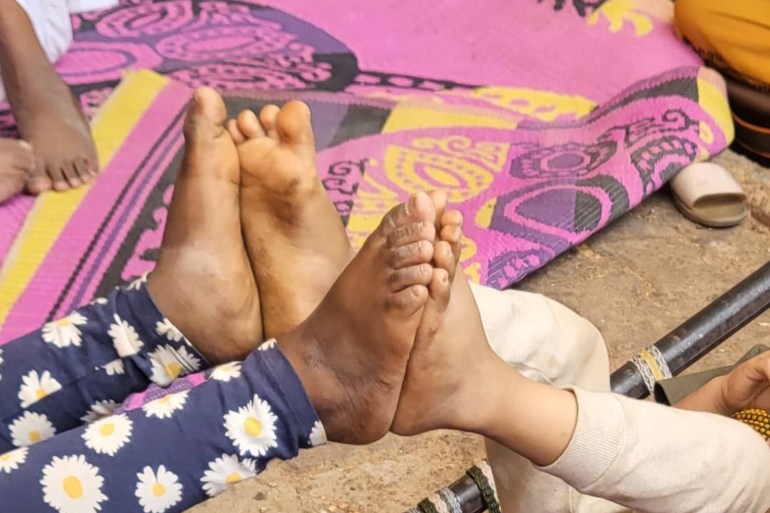
Towards nightfall, I drifted outside the port gates looking for food. Low on cash and in spirit, I pushed back behind the makeshift shacks looking for vendors who had set shop off the long-queuing buses. Huge crowds congregated around the few stopgap shops. I never made it to the front of any queue before food ran out.
Water was scarce and expensive, sold only at particular times of the day. As per the law of suffering that seemed to govern our displacement, the traders’ logic was shaped mostly by unchecked maximisation of profit.
Longer queues – especially for water, at a higher price per bottle – meant they could cover a week’s spread in a day. I listened in as they shouted the day’s set price from atop a vehicle – the asking price was $15 for a small packet of 12 bottles, the double figures no longer phased me.
I reached into my pocket counting the previous day’s change, barely enough for a few bottles. Between ourselves and two large families, we had to ration the two items we could afford: water and bread. The children and the elderly had priority.
The hardship did not bother me as much as its effect on my young nieces and nephews. Their lively complaints faded into muffled sighs and eventually endless hours of sleep, in what I speculated was the body’s defence mechanism to escape the trauma. As I had nothing to offer, not even an explanation as to the delay or when it would end, I silently sat next to them as they slept.
Uprooted community clinging to hope
Five days had passed since we arrived at Argeen. At some points, we heard the border was closed permanently; at other times, that access was being negotiated by both sides. The most hopeful justification I clung to was a backlog – which would clear, eventually.
I settled into the comfort of prolonged suffering in the absence of any information or justification from either authority as to the delay or when it will end. The long, uneventful days at the border with their repetitive survival activities within defined parameters brought with them a false sense of stability.
I had eventually mastered my family’s daily needs: food, water, a spot under the shade to rest, and routes to achieving them at minimal cost.
Access to the toilet was difficult, if not impossible, while the scarce food and hardship put the elderly at risk of strokes and other health complications. With no way to get medical care, any minor health problem could spell catastrophe. Twice, when we were there, an ambulance came to collect dead bodies. I shielded myself, not wanting to learn about what had happened, scared that these stories would further feed into my anxiety.
Information and the right to seek it remained alienable. The survivalist sense of accomplishment kept me going while we waited in apprehension to reach the other side, even with all the likely challenges it would pose. We were an uprooted community, clinging to the abstract idea of the right to humanity.
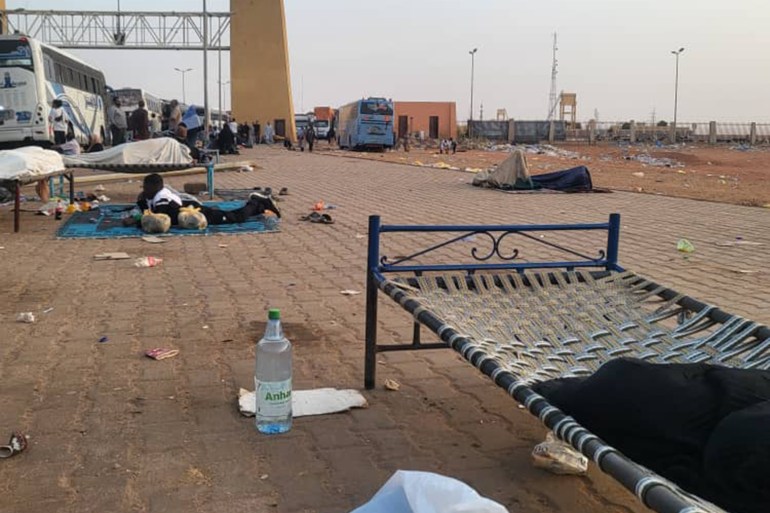
Sudanese people are no strangers to hardship. In the last decade alone, the country had gone through the upheavals of economic freefall, followed by an uprising against the status quo and the establishment that had enabled and benefitted from it. The Sudanese revolution of 2018 masked through its idealism the high cost of political instability and economic change borne by its most vulnerable. From the indiscriminate killing of its youth on the streets by the groups who took power in the name of democracy, loss of livelihoods, increased and evolving patterns of violence to the latest chapter of open urban warfare and the subsequent forced displacement, the renewed hope of justice, then and now, keeps us going.
We finally arrived in Aswan in the early morning hours of April 29. We retreated into a hotel where we had managed to book three rooms to share. By 10am, I was awakened by the sounds of the children playing in the yard, and a sense of relief washed over me.
We spent the rest of the day in Aswan recuperating. Early the next day, the elderly took a plane while the young and able took the train, starting a half-day’s journey to Cairo. Overbooked transport meant that we couldn’t arrange for our large family to travel together.
I woke up on April 30 in Cairo in the beautiful apartment our friends had booked on our behalf. The dusty strip of the port where we spent the last five days without access to much was a fading memory. Together with my extended family, we went about setting up our new life in Egypt – a bustling but welcoming place. We didn’t know how long we would be there and what the developments in Sudan might mean for our plans, but before I left I promised my mother a speedy return.
I stayed with my family for a few days to help them settle in before I, too, returned to my life and work in England at the beginning of May.
From my little window in Oxford, I dream of the Nile Valley, both what was left behind and the new future that awaits us.
Raga Makawi is a Sudanese editor at African Arguments based in the UK